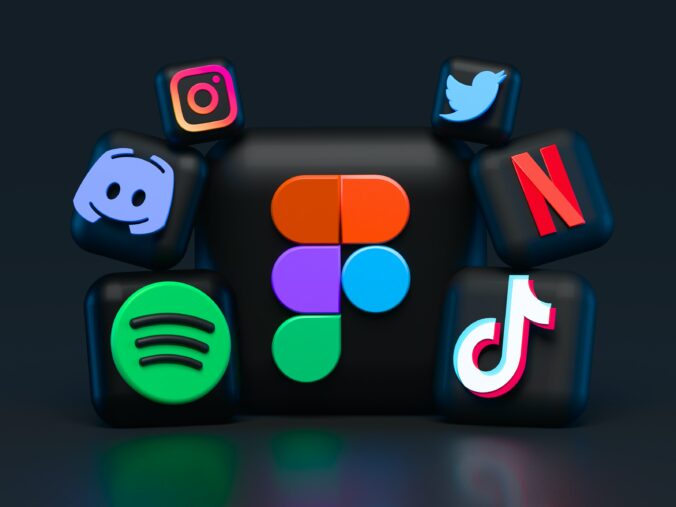Before starting the digital identity, I would like to clarify ‘what is identity.’ Identity is one’s personality, looks, and qualities that differ from other people, such as the student ID card, BCID, which presents one’s age, sex, address… And digital identity represents an individual’s engagement online, including their shared information, blog posts, comments, photos, social media account, and so on (Stoller, 2016). Everything people share or post online will form a digital identity. Thus, I think it is more like a virtual database than paper-based identity documents to record one’s footprint online. Digital identity could be professional or personal, depending on how you present online. A professional approach allows people to connect and collaborate with others in the line of work or study, facing more formal events such as job searching. A personal approach refers to people connecting with family, friends, or some organizations which deliver topics you are interested in. Some applications like Snapchat, Facebook, link people together to promote casual communication.
Jawed et al. argued that students spent heavy time on social media, which resulted in a negative academic performance. These personal approaches regarding study interact negatively with social media. Students will lose face-to-face communication and interpersonal ability (Jawed et al., 2019). Stoller (2016) stated an individual had a lifelong learning journey, too professional approaches to digital identity may lose ‘joy of learning.’ It has become a common way that people post blogs or share comments on social media using their personal account, which reflects freedom of expression. It is recommended to develop two accounts for both personal and professional usage, avoiding the privacy risk of sharing too much daily life or personal information to public/a larger audience. Moreover, in the professional approach, colleagues or leaders may not want to see your personal beliefs or values, as they are not related to job or work. Although Personalized Learning Network provides great opportunity for students to exchange ideas, thoughts, and knowledge online, it’s encouraged to differentiate the usage and influence of personal and professional identity intersection (Jawed et al., 2019).
In the Youtube video, an economist said over 75 million people have access to the internet at the beginning of 2019. Digital identity provides convenience for developing countries such as India. It gives non-registered citizens a chance to identify themselves online, meaning they will have an online ID to prove their status (Davos, 2019). In 2022, over 60% of the global GDP would be expected to be digitized. People, devices, and businesses will interact more online. Nilekani, who attended the conference, said that India had implemented the digital identity for more than 10 years. It enhances the public service efficiency and convenience, allowing the public to access the service more effectively. Meanwhile, some economists at the Davos conference argued that the government should conduct concrete policies/laws to control one’s online movement, including accessing and retrieving personal data. Leakage of privacy date and online movement is an issue consistently disturbed the public. The public has the right to know who has accessed his/her database. Moreover, Stoller (2016) said that online fake news would confuse the public, which was not permitted. Punishments should be developed to control people who posted not real information.
Digital wallet as a product from technology and digital identity, provides conveniences for the public. Apple-pay, PayPal, and Alipay are the most common applications nowadays. As Davos conference (2019) referred “all the time we can save, with the trusted, secured digital identity we can build many digital services to make our life much easier”. I usually use Apple-pay when I go to the grocery store, and it is quite easy to purchase goods by using the phone to tap the machine and the payment is done. It reduces the payment process of giving changes and can be widely used under the COVID-19 pandemic, avoiding unnecessary body contact. When people enjoy the benefits brought by the digital wallets, they should always be aware of the potential risk behind this innovation. Whether the public should trust the digital wallet and how companies gain public trust is still a question. Wallet information, payment history, personal data will be easily stolen from the scanning of credit/debit cards. Hence, in order to protect the public safety and promote a more convenient way of life, the government should create and enact related policies immediately; technology should be developed to strengthen the digital wallet protection.
Reference:
Davos.“Press Conference The Value of Digital Identity for the Global Economy and Society.” uploaded by World Economic Forum, 5 Feb. 2019, https://www.youtube.com/watch?v=1-V7yxrOmw
Stoller, Eric.“What is Digital Identity.”Youtube, uploaded by University of Derby, 25 November 2016, https://www.youtube.com/watch?v=u0RryRbJza0
Jawed, Saira, Usman Mahboob, and Rahila Yasmeen. “Digital Professional Identity: Dear Internet! Who Am I?” Education for Health (Abingdon, England), vol. 32, no. 1, 2019, pp. 33-35.
Questions:
– What is a digital identity?
– How do personal versus professional approaches to digital identity affect social media use?
– How do digital identities converge in networked publics – what are the impacts and/or benefits?
– Can a digital wallet provide trust in networked publics?

Hi Yi.
I find your view on digital wallets plausible. Our trust in digital wallets must be fund on a reliable and stable relationship between policymakers and individuals. But I would say that this relationship is not established on a fair and healthy base because the will and benefits of individuals are not always represented and considered in policies, and this problem will remain if we do not participate in acts to defend our interests.
Hi Yiyan,
I am really appreciate to read your excellent post! I strongly agree with your opinion that the professional use of digital identity in social media would cause “lose ‘joy of learning.’” because their digital identities may be limited by their professional field. The opnion of digital identity could control ppeople’s online actions so that their actions could be limited by laws is absolutely important and authentic. Thanks for sharing your post and welcome to comment on mine!
Angel Liu